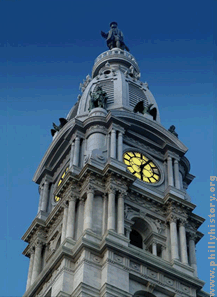Citizen, Tax Thyself
March 25, 2009 - Like so many other cities across the country, Philadelphia entered 2009 with a growing budget deficit. Clearly, there would need to be changes to city programs and services if the city were to weather the recession. Equally clearly, nobody wanted to see cuts to any essential service — and the definition of essential varied greatly.
How, then, should city leaders decide what programs to cut? And how could this happen without alienating city residents?
 Enter the Penn Project for Civic Engagement (PPCE). In February, PPCE — under the direction of GSE faculty member Harris Sokoloff — hosted four long-planned community forums across the city. The name of this series made its mission clear: "The City Budget: Tight Times, Tough Choices, Citizen Priorities." The city offered to work in cooperation with PPCE by providing budget data and making city budget officials available at the forums to answer participants' questions.
Enter the Penn Project for Civic Engagement (PPCE). In February, PPCE — under the direction of GSE faculty member Harris Sokoloff — hosted four long-planned community forums across the city. The name of this series made its mission clear: "The City Budget: Tight Times, Tough Choices, Citizen Priorities." The city offered to work in cooperation with PPCE by providing budget data and making city budget officials available at the forums to answer participants' questions.
At these forums, which were open to all city residents (and to suburbanites working in the city), Philadelphians met in small groups to work through some of the actual budget choices the city was facing. Using city budget data, PPCE developed a worksheet to guide discussions. The worksheet was inclusive, taking the mayor at his word when he said that everything was on the table: municipal salaries, library funding, trash collection, increases to fees and taxes, even the police department budget.
Trained PPCE moderators facilitated these spirited citizen discussions, which generated a wide array of ideas for city leaders to consider. Just as important, the forums fostered a broader citizen understanding of the city's fiscal challenges and a greater sense of respect for the balancing act facing the mayor and City Council.
"We had anticipated 200 to 250 people at each forum, but got twice that many. Many people started out with distrust and skepticism, but by the end, most had engaged and learned how difficult the work was," explained project director Harris Sokoloff.
Some of the findings were surprising. City residents were more willing to pay for services — through fees and even tax increases — than anyone had expected. "Given a chance to confront the tough tradeoffs, most citizens opted to tax themselves — while struggling to give a tax break to those less fortunate," noted PPCE's final report on the forums.
In early March, Sokoloff and co-director Chris Satullo of WHYY presented the results of the citizens' work to the mayor and City Council. The mayor had promised to take PPCE's work into account when finalizing the budget. This consideration for citizen input is new — and welcome — in Philadelphia.
And once the city budget is balanced? Sokoloff plans to continue working to keep citizens engaged with the work of government. At the workshops, many citizens were frustrated with the narrow focus on the upcoming year; they urged the mayor to consider solutions to longer-term concerns, so that they don't become "issues without end." Suggestions included improving collections of delinquent taxes and fees, changing the pension and health care structures currently in place, and revising work processes throughout the city government to increase efficiency.
"Philadelphians are eager to be a part of the solution to these long-term budget challenges," said Sokoloff. "We're looking forward to many more projects like this one."
Learn more about the Penn Project for Civic Engagement at www.gse.upenn.edu/pcel/progams/ppce.
